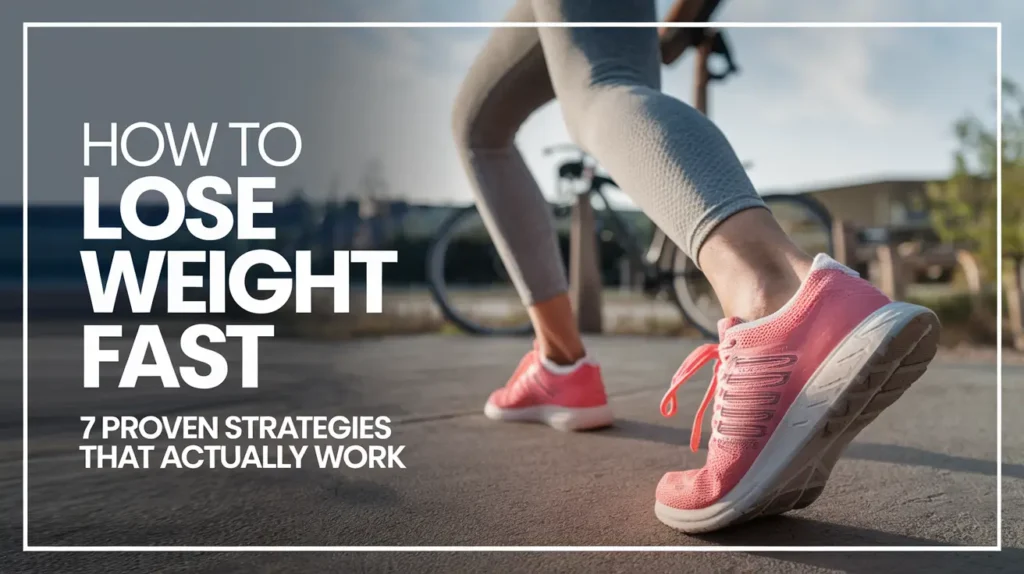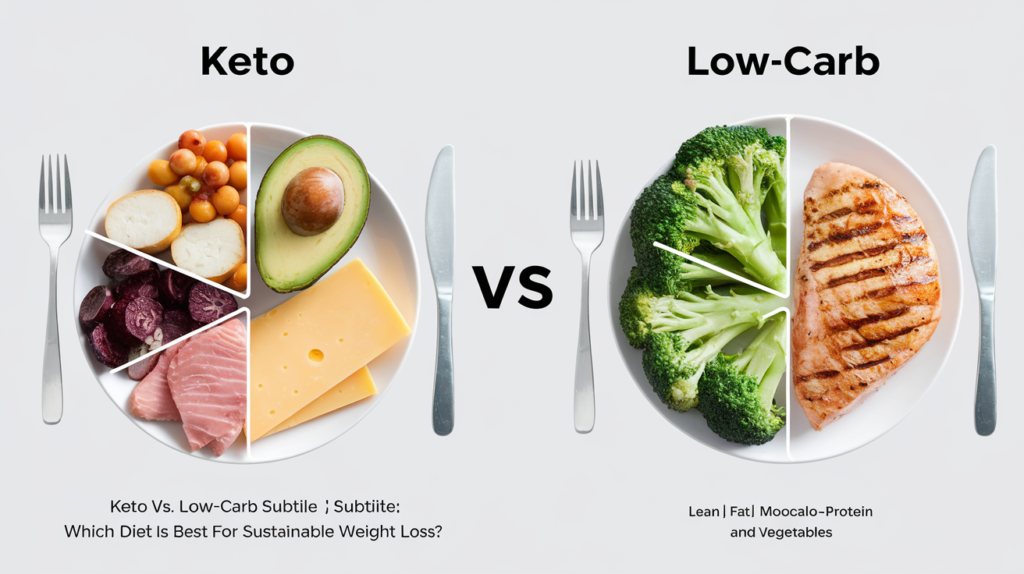Losing weight fast—it’s something many of us dream about, but can it really be done in a healthy and sustainable way? The truth is, rapid weight loss is possible, but it requires dedication and smart choices. Instead of resorting to extreme measures, like crash diets or unsustainable routines, you can achieve your goals by following tried-and-true strategies that actually work.
In this article, we’ll dive into seven proven ways to lose weight quickly, without sacrificing your long-term health. Let’s get started!
1. Embrace a High-Protein Diet
A high-protein diet is one of the most effective ways to shed pounds quickly. When you eat more protein, you’re not just filling your stomach—you’re giving your body the tools it needs to boost metabolism, burn fat, and maintain lean muscle mass.
Why Protein is Important for Weight Loss
Protein plays a crucial role in your body’s ability to repair and build tissues, but when it comes to weight loss, it’s also known for its ability to curb hunger and boost metabolism. Eating more protein helps to stabilize blood sugar levels and reduce cravings, which means less mindless snacking throughout the day.
How Protein Curbs Hunger and Boosts Metabolism
When you consume protein, your body works harder to break it down, which burns more calories in the process. This is known as the thermic effect of food (TEF), and it’s higher for protein than for carbs or fats. Moreover, protein keeps you feeling full longer by reducing levels of ghrelin, the hunger hormone.
Best High-Protein Foods to Include in Your Diet
- Eggs
- Chicken breast
- Fish (especially salmon and tuna)
- Greek yogurt
- Quinoa
- Lentils
- Cottage cheese Incorporating these foods into your meals can significantly boost your protein intake, helping you lose weight faster.
2. Cut Back on Sugars and Refined Carbohydrates
Cutting back on sugar and refined carbs is a surefire way to kickstart weight loss. These foods are notorious for spiking blood sugar levels, causing cravings, and leading to fat storage.
The Negative Impact of Sugar and Refined Carbs on Weight
Sugary and processed foods may taste delicious, but they offer little nutritional value and can wreak havoc on your body. When you consume sugar or refined carbs, your body quickly converts them into glucose, leading to a sharp rise and then a crash in blood sugar levels. This triggers hunger and overeating, making it harder to lose weight.
Healthy Alternatives to Sugary and Processed Foods
Instead of reaching for sugary snacks or processed meals, opt for whole foods that are rich in fiber and nutrients. Swap white bread for whole grains, soda for water, and processed snacks for fruits or nuts. These small changes can make a big difference in your overall calorie intake.
3. Stay Hydrated and Drink More Water
Water is your weight loss secret weapon. Staying hydrated is not only essential for your overall health but can also help you lose weight faster.
The Role of Water in Weight Loss
Drinking water helps flush out toxins, supports digestion, and can even temporarily boost your metabolism. When you’re well-hydrated, your body is more efficient at burning fat and utilizing energy.
Timing Your Water Intake for Maximum Results
One of the easiest weight loss hacks is to drink a glass of water before meals. Studies have shown that drinking water 30 minutes before eating can reduce appetite and lead to fewer calories consumed during the meal.
4. Incorporate Strength Training and HIIT Workouts
If you want to lose weight fast, you can’t rely on diet alone—exercise is a must. But not just any exercise will do. Strength training and high-intensity interval training (HIIT) are two of the most effective methods for burning fat.
The Benefits of Strength Training for Weight Loss
Strength training, like lifting weights or bodyweight exercises, helps you build muscle, which in turn increases your metabolism. The more muscle mass you have, the more calories you burn, even at rest.
High-Intensity Interval Training (HIIT) for Fast Results
HIIT involves short bursts of intense exercise followed by brief rest periods. This type of workout torches calories and fat in a fraction of the time it takes for steady-state cardio.
A Sample Weekly Workout Routine
Here’s a simple example of a weekly workout routine:
- Monday: Full-body strength training (squats, deadlifts, push-ups)
- Tuesday: HIIT (sprints or cycling)
- Wednesday: Rest or light activity (walking)
- Thursday: Upper body strength training (pull-ups, shoulder press)
- Friday: HIIT (jump rope or stair sprints)
- Saturday: Lower body strength training (lunges, leg press)
- Sunday: Rest or yoga/stretching
5. Prioritize Sleep and Manage Stress
When you’re trying to lose weight, it’s easy to focus solely on diet and exercise. But did you know that sleep and stress management are just as important?
The Connection Between Sleep and Weight Gain
Studies have shown that people who don’t get enough sleep are more likely to gain weight. This is because lack of sleep disrupts the hormones that regulate hunger (ghrelin) and fullness (leptin), leading to overeating.
How Stress Affects Weight and How to Combat It
Stress triggers the release of cortisol, a hormone that can promote fat storage, especially around the belly. When we’re stressed, we often turn to comfort foods, which can derail weight loss efforts.
Tips for Better Sleep and Stress Management
- Establish a Sleep Routine: Aim for 7-9 hours of sleep per night by going to bed and waking up at the same time every day.
- Create a Relaxing Bedtime Environment: Keep your bedroom cool, dark, and quiet to promote better sleep.
- Practice Stress-Relief Techniques: Consider yoga, meditation, or deep breathing exercises to help manage stress effectively.
6. Track Your Food Intake and Stay Accountable
To lose weight effectively, knowing what you’re eating is crucial. Tracking your food can lead to better awareness of your eating habits.
The Importance of Keeping a Food Journal
Writing down everything you eat can help you identify patterns in your diet and reveal where you might be going wrong. It’s a simple way to hold yourself accountable for your food choices.
The Role of Calorie Counting and Portion Control
Calorie counting can be a valuable tool in your weight loss journey. Understanding how many calories you consume versus how many you burn can provide insight into your progress and help you make necessary adjustments.
Using Apps and Tools to Stay Accountable
There are numerous apps available, such as MyFitnessPal or Lose It!, that can make tracking your food intake a breeze. These tools can also help you log exercise, making it easier to see the big picture of your health.
7. Stay Consistent and Avoid Crash Diets
While quick fixes may seem appealing, they often lead to disappointment and yo-yo dieting. Instead, focus on creating lasting habits.
The Dangers of Crash Dieting
Crash diets often promise rapid weight loss, but they can lead to nutritional deficiencies, muscle loss, and metabolic slowdown. Plus, once you return to normal eating habits, the weight usually comes back, often with extra pounds.
Building Sustainable Habits for Long-Term Success
Instead of seeking fast results, aim for gradual changes you can stick with. This might include incorporating healthier foods into your diet, exercising regularly, and focusing on mindful eating.
Bonus Tips for Faster Weight Loss
Increase Fiber Intake
Fiber-rich foods, such as fruits, vegetables, and whole grains, help you feel full longer and can prevent overeating. Plus, they aid in digestion and can keep your gut healthy.
Intermittent Fasting for Weight Loss
Intermittent fasting (IF) involves cycling between periods of eating and fasting. This approach has been shown to enhance fat loss and improve metabolic health.
Limiting Liquid Calories
Sugary drinks, like soda, juice, and alcohol, can add unnecessary calories to your diet. Opting for water, herbal teas, or black coffee can significantly reduce your overall calorie intake.
Conclusion
Losing weight fast doesn’t have to be complicated. By implementing these seven proven strategies—embracing a high-protein diet, cutting back on sugars, staying hydrated, incorporating exercise, prioritizing sleep, tracking your intake, and staying consistent—you can achieve your weight loss goals in a healthy and sustainable way. Remember, the journey to weight loss is a marathon, not a sprint. Focus on building habits that you can maintain long-term for the best results.
FAQs
How much weight can I lose in a week by following these strategies?
The amount of weight you can lose in a week varies depending on individual factors, but a safe and sustainable rate is about 1-2 pounds per week.
Is it safe to lose weight fast?
While rapid weight loss can be safe for some, it’s essential to prioritize your health and well-being. Always consult with a healthcare professional before starting any extreme diet or exercise program.
Can I lose weight without exercise?
Yes, you can lose weight primarily through dietary changes, but incorporating physical activity will enhance your results and improve overall health.
What should I eat to lose belly fat quickly?
Focusing on whole foods, such as lean proteins, healthy fats, and plenty of fruits and vegetables, can help target belly fat. Reducing sugar and refined carbs is also crucial.
How do I stay motivated during my weight loss journey?
Staying motivated can be challenging. Set realistic goals, celebrate small victories, find a support system, and remind yourself of the reasons you want to lose weight.
This article provides a comprehensive guide to losing weight quickly, emphasizing practical strategies that can lead to effective results without compromising health. By incorporating these tips, you can pave the way toward a healthier, happier you!



